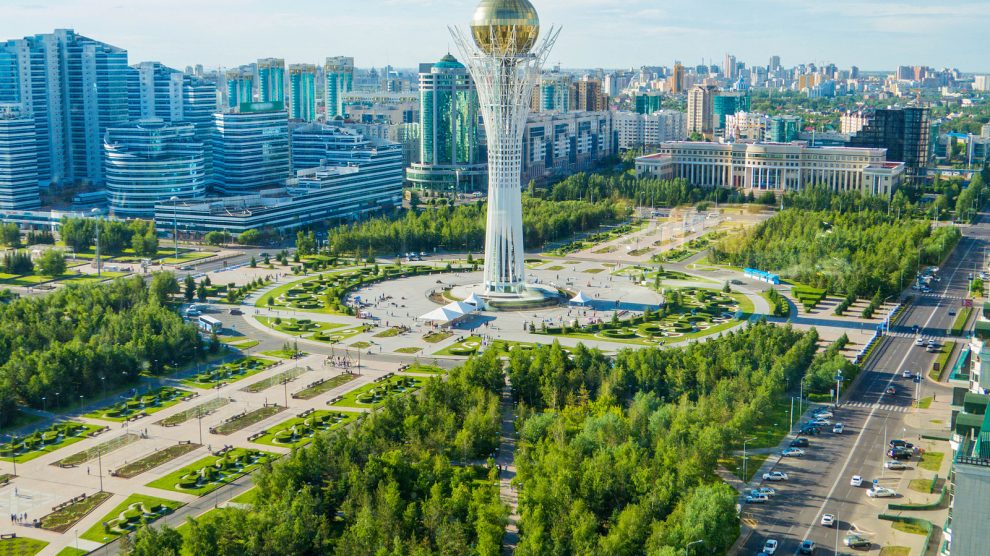The potential rewards of more engagement with Central Asia—in terms of energy security, geopolitical stability, and economic growth—are too substantial to overlook.
As French President Emmanuel Macron gears up for an official visit to Kazakhstan and Uzbekistan on and November 1 and 2, the growing significance of France’s ties to Central Asia cannot be overstated.
A deeper commitment in this region is crucial for both France and Europe at large. Strengthening bonds with Central Asia could secure energy security for Europe, provide a supply of rare earth elements, and restore geopolitical balance in the Central Asian region.
- Growth in Central Asia is outpacing that of emerging Europe
- Kazakhstan’s pivot towards the West is grabbing the attention of investors
- How Uzbekistan can become a regional tech hub
One of the clear benefits of a fortified alliance with Central Asia lies in potential energy sector collaborations. Notably, Kazakhstan possesses significant uranium reserves and is and is the world’s largest producer. Given that roughly 70 per cent of France’s electricity comes from nuclear power, a deepened partnership could ensure a consistent uranium supply for French reactors.
Furthermore, this partnership could address Europe’s escalating energy concerns. Recent disturbances in global energy markets, coupled with political tensions, have underscored Europe’s need to diversify its energy sources. With its untapped hydrocarbon reserves and potential for renewable energy, Central Asia presents a viable solution.
Kazakhstan and several other Central Asian states, while still underexplored, are also rich in rare earth metals, important for the green energy transition. These metals play a pivotal role in the manufacturing of a vast array of technologies, from smartphones and wind turbines to rechargeable batteries for electric vehicles.
Currently, Europe relies heavily on China for these indispensable minerals. This dependency on a singular supply chain is risky and jeopardises its technological advancement.
By proactively deepening ties with Central Asian nations, France and Europe can diversify their rare earth supply chains. This move will reduce dependency on China, fostering greater economic independence and resilience against potential trade disruptions.
Cooperation in nuclear energy
Notably, Kazakhstan is preparing to conduct a referendum on building a nuclear power plant within its borders. Given France’s profound expertise in the nuclear sector, this offers a prime opportunity for collaboration.
France, which houses some of the world’s foremost nuclear energy companies, possesses both the experience and technical acumen to assist Kazakhstan in navigating the challenges of constructing and managing a nuclear facility. The potential partnership promises more than just construction; it encompasses knowledge sharing, the establishment of safety measures, and enduring contracts for maintenance and operations.
Europe should view Kazakhstan’s considerations on nuclear energy as aligning with its broader objectives concerning energy security, climate change mitigation, and regional stability. With the EU identifying nuclear energy as a key sector for reaching carbon neutrality by 2050, Kazakhstan’s initiatives could attract supportive allies in the West.
Geopolitical leverage: Countering influence
Major powers like Russia and China are actively seeking influence in Central Asia, a region historically caught in the crosshairs of the so-called Great Game. Russia, with its historical and economic ties, and China, using the Shanghai Cooperation Organisation and its Belt and Road Initiative, have embedded themselves deeply in the region.
France’s enhanced involvement in Central Asia can act as a counterbalance, ensuring that no single power dominates the region. This strategic approach benefits both Europe and Central Asia’s interests.
Now is a good window of opportunity. While Kazakhstan has strong economic and cultural ties with Russia, its leadership refused to endorse Russia’s invasion of Ukraine. Instead, they have advocated for a cessation of hostilities and the initiation of peace talks, in accordance with the principles of the UN Charter.
Additionally, Kazakhstan’s President, Kassym-Jomart Tokayev, has stressed that Kazakhstan will adhere to Western sanctions.
Regarding tangible initiatives, the advancement of additional trade routes between Europe and Asia, such as the Trans-Caspian Transport Route or the “Middle Corridor”, would represent a significant achievement for Europe. This trade route, traversing from Turkey through the Caucasus and Central Asia, reaching China, diversifies and potentially speeds up trade avenues.
Transport times along this route have been cut from 38-53 days in the previous year to just 19-23 days. The objective is to further shorten this to 14-18 days. The expansion of this corridor could act as a hub for enhanced trade, cultural interchange, and geopolitical collaboration between Europe and Asia.
France’s amplified engagement in Central Asia, beyond being a mere counterweight to the influences of major powers, could actively foster the development and prominence of the Middle Corridor. This not only provides Europe with alternative trade routes that can reduce transit times but also underscores the strategic importance of Central Asia as a bridge between the East and West.
By advocating for the Middle Corridor, France can position Central Asian nations as active contributors to global connectivity and collaboration, rather than merely being bystanders in the larger geopolitical landscape.
Increased collaboration
President Macron’s official visit should mark the beginning of a new era in France-Central Asia relations. The potential rewards—in terms of energy security, geopolitical stability, and economic growth—are too substantial to overlook.
It’s time for France, and by extension, Europe, to spearhead enhanced cooperation and shape a prosperous, balanced future in Central Asia.
Unlike many news and information platforms, Emerging Europe is free to read, and always will be. There is no paywall here. We are independent, not affiliated with nor representing any political party or business organisation. We want the very best for emerging Europe, nothing more, nothing less. Your support will help us continue to spread the word about this amazing region.
You can contribute here. Thank you.







Add Comment